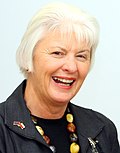| President of the Labour Party | |
|---|---|
| Term length | No fixed term |
| Inaugural holder | James McCombs |
| Formation | 7 July 1916 |
| Deputy | Carol Beaumont |
| Website | Labour Party profile |
The president of the New Zealand Labour Party is the highest-ranked organisational figure within the New Zealand Labour Party. The president heads the party apparatus outside of parliament, serving as the chairperson of both the party's council and policy council. Since 2022, the office has been held by Jill Day. [1]



































